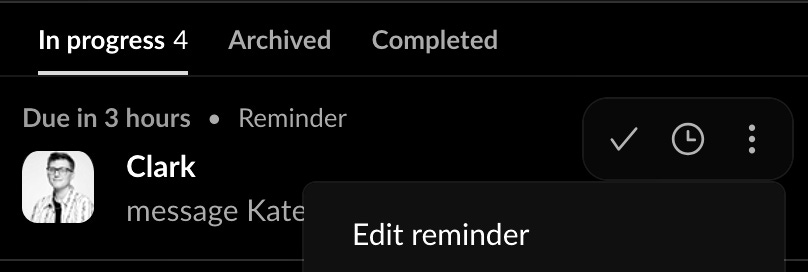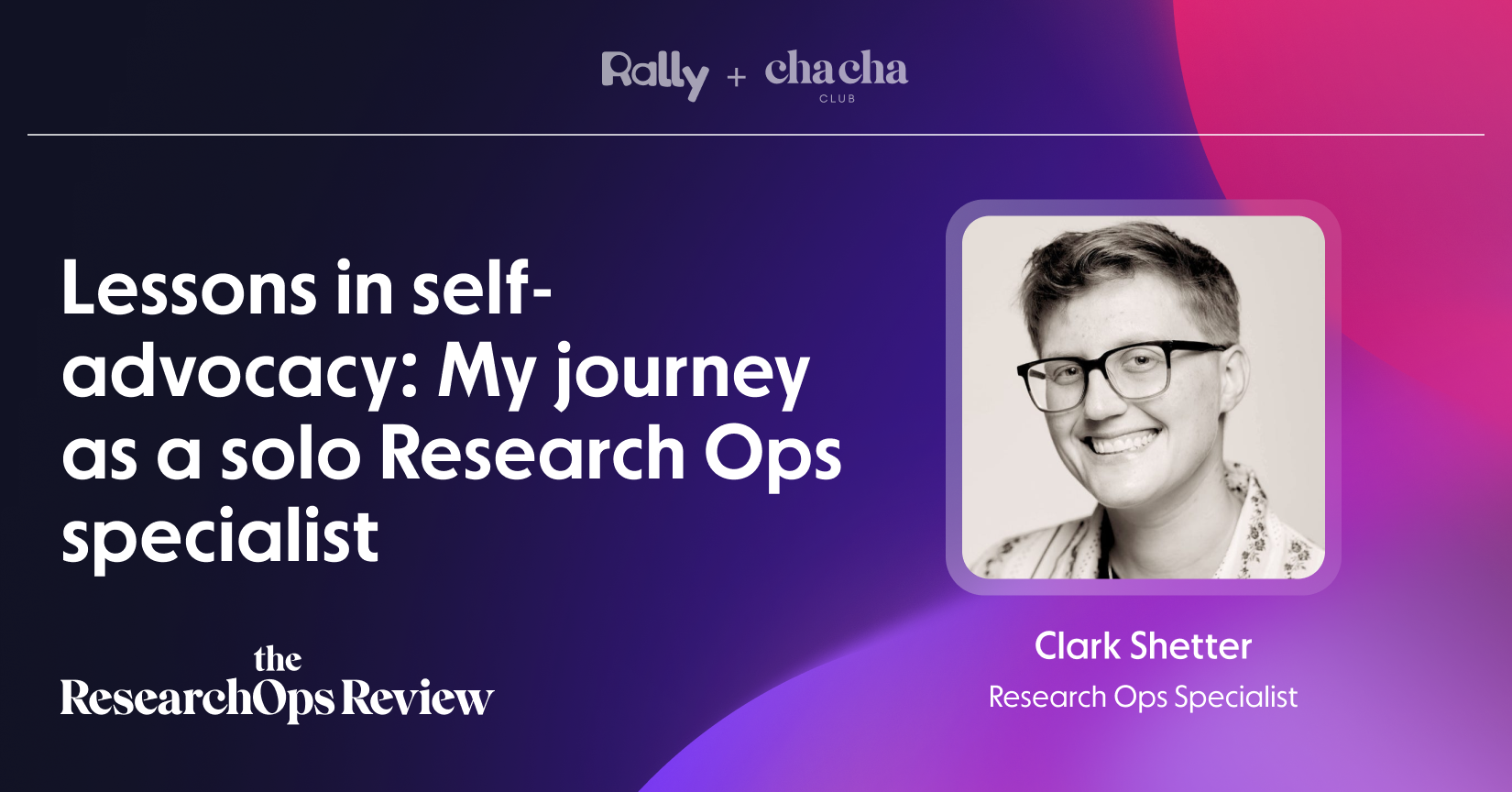Lessons in self-advocacy: My journey as a solo Research Ops specialist
In July 2024, I faced the threat of being put on a performance improvement plan for the first time in my life. It happened right as I was preparing for top surgery, and hoping to have the operation before the government changed its policies. Around the same time, my team began procuring a new insights repository, adding to an already oversized workload. Between personal health concerns, family emergencies, and a growing pile of work, the second half of 2024 was an unrelenting challenge. Where I would normally rise to the occasion and white-knuckle through it, I struggled to show up as the best version of myself — culminating in my falling short of management’s expectations. We all know stress has a negative impact on our lives, and I experienced firsthand how chronic stress melted away my ability to handle adversity gracefully.
Even if you’re only slightly out of your comfort zone, it can be challenging to manage a growing workload in less-than-ideal conditions. The pinch of budget cuts, layoffs, and hiring freezes reaches throughout the tech industry. More and more, workers from across disciplines are being asked to perform and deliver more with fewer resources. I left my role as a Research Ops specialist in late January this year, and have taken time to reflect on what happened, where I went wrong, and which signs I missed along the way. With a bit of distance, I’m ready to share the lessons I learned. I hope you’ll take what makes sense for you from this article, and leave the rest. Operations folks are meant to enable others, but first, we must enable ourselves to do our best work.
Communicating under stress
As the strain of daily life compounded from July to December last year, I found that communication with my manager about my personal life deteriorated. I recall not wanting to discuss how terribly things were going for me — especially not my thoughts and fears around timing for gender-affirming care.
Until this point, I spent years debating whether I should pursue top surgery. Considering the looming presidential election and the threat of stripping away healthcare coverage for trans folks, it felt like that moment in time might be my last chance. I went to my consultation and was told I could have surgery as soon as September 23, 2024. I was shocked and excited that it was so soon! I also felt terrified that I wouldn’t be granted leave. But here’s the thing: When I don’t know exactly how a scenario will play out, I tend to keep to myself. Sometimes doing nothing feels safer than sharing hard truths, so I opted not to share anything with my manager regarding my surgery—leaving them in the dark about what I was going through emotionally. Unsurprisingly, my manager assumed that things were business as usual.
In retrospect, this was a poor decision on my part. I respect and stand by my desire to keep my personal life private. However, I regret not strategizing ways to share with my manager how greatly my mental health and focus at work were being affected, while protecting my privacy.
Throughout this time, I was so stressed and distracted by obsessing about what could go wrong. I believed my boss would see this as a reason to terminate me or give me some sort of demerit for sharing personal challenges or negative feelings at work. I see now that I was so focused on what I couldn’t control that I’d forgotten about what I could control: my feelings — and to whom, and how, I communicate them.
Without this experience, I wouldn’t have learned how to approach the kinds of situations that span the personal and professional; the kinds of situations that require — and deserve — great care. And that approach starts with space and support.
Creating a support system
I started out as an intern at my previous role, and I was fortunate to build relationships with a mentor and a buddy with whom I still meet every two weeks on Zoom. Shout out to Erica Atencion and Max Taylor, who serve as constant sources of inspiration and advice. More than anything, Erica and Max remind me that I’m a person, not a machine, and that it’s okay to have an unproductive week. Their support was a lifeline during tough moments when my workload felt insurmountable, and my relationship with my manager was at its worst.
As the demands of my role grew and my ability to manage them dwindled, Erica and Max were a safe place to share what otherwise felt unbearable to disclose to my manager. They didn’t judge me because they had been there before, which was reassuring and validating. Sharing my feelings in a low-pressure space allowed me to clear my head and come back to work knowing that I had people in my corner. Everyone needs and deserves support in facing challenges — support both found in others and from within — especially when you’re up against a big life challenge while navigating the demands of a high-pressure job.
If you’re not sure where to find your support system, start by seeking out mentorship opportunities within your company. Many organizations offer mentorship programs, and if it’s available, you can join an Employee Resource Group (ERG) for additional guidance. There are also wonderful communities of practice you can join, like the Cha Cha Club! Building relationships with colleagues who can offer advice, empathy, and encouragement is essential, especially when you're managing the complexities of work in an economy that demands more from each of us.
Beyond external support, I’ve learned how important it is to cultivate my internal cheerleader. While it certainly matters to have a support system outside of yourself, it can be even more crucial to hone the ability to validate and encourage yourself when things go wrong. I had many difficult meetings with my manager where I felt like I was falling short. In those moments, it was my inner strength that helped me pick myself back up and keep moving forward. I needed to distance myself from the constant barrage of thoughts about what needed to get done and how my manager perceived me and my work. The best place for me to find peace is in nature, so I took short retreats outside. Whether it was scheduling a break to stand on my porch and feel the sun on my face, or walking to see my neighborhood duck flock at the creek, I came back remembering that my worth is not bound to my productivity at work.
Prioritizing pace
For every new task added to your list, deprioritize or reprioritize another. This is allowed (and necessary) when you are a team of one, and no one else is there to pick up the slack or remove obstacles in your path. It’s vital to collaborate with leadership on what is actually a priority, and what is not. This is important self-advocacy, and it can be intimidating because it requires you to directly address management. But if you approach it with a collaborative mindset rather than a confrontational one, you can often mitigate the potential for conflict.

Take the migration we did from Jira to Dovetail in August 2024. It was a massive undertaking that demanded more time and energy than I realistically had. Thankfully, a mentor and support system of mine, Matthew Pereira, introduced me to a Miro board (see Figure 1) he’d created to illustrate to his manager the sheer volume of tasks he was being asked to accomplish and meetings he was required to attend. I copied Matthew’s board for my own purposes and sent my manager a quick video over Slack to present a view of all my project tasks — and propose which ones to deprioritize in an effort to move the project forward.
My manager was receptive. Seeing the workload laid out so clearly made it easier for them to agree to remove low-priority tasks from my plate. The visual approach worked! But in hindsight, I only used this method when I was already drowning in work. That’s the tricky part of working solo in Research Ops: you’re responsible for both tactical execution and strategic planning, and it’s easy to get caught in the weeds. The more proactive you are about prioritization, the less likely you’ll find yourself overwhelmed in the first place.
Managing workload
I discovered that by planning more and communicating my ideas proactively, I wound up doing less work than if I just pushed through my workload. Prioritizing tasks is helpful, but none of it matters if management doesn’t agree with your prioritization. This is where communication is absolutely crucial. My manager and I never fully agreed on what distinguishes a strategic task from a tactical task, and I lost a lot of valuable time to tasks that ultimately weren’t worth the effort. If you can’t align your work with the larger roadmap, it will be challenging to be considered essential in your role or an asset to the company.
Adapting your work to strategic goals in your organization or company is especially difficult in a team of one. It’s inevitable that some tasks won’t count as big strategic wins, but are necessary for the research function to operate successfully. I couldn’t stop answering questions or hosting trainings about how to use our research tools, but I could propose a new process or system to make this process more manageable for myself. Of course, this is easier said than done, because of how quickly overwhelm can transform into a disruption of critical thinking. This is why communicating clearly and consistently about your mental state and work progress is absolutely crucial to your success in research operations.
Finally, only you know when you’re reaching burnout. Only you can say, “This is too much.” No one is going to advocate for your well-being the way you can. I’ll admit there were times when, if my manager pushed back on my request, I simply assumed they were right, and I was wrong. That fear, that questioning of my own judgment, was deeply tied to my paranoia about job security. But the truth is, pushing back isn’t a sign of weakness; it’s a sign of self-respect. Learning to advocate for yourself isn’t just about workload management; it’s about valuing yourself enough to protect your energy, your mental health, and your ability to do great work sustainably.
Automating in order to create
The sheer number of tools available to use as a practitioner in this field is mind-numbing. The automation capabilities baked into those tools are equally vast. Slack has reminders and workflows, Google Calendar has tasks, Jira has a billion potential features, Zapier creates new automations, and there are seemingly 800 other tools with similar offerings! After two years of working with some automation-obsessed people, I finally jumped aboard the automation train. Setting up automations can be a pain, but once in place, they can be time and brainwave savers. Anything you can do to reduce cognitive load and free up your mind for the work that matters, like strategic priorities, is worth the investment.

For example, I utilized Slack reminders for tasks I needed to complete the following week during my Friday planning block. I’m part of the ‘if I don’t write it down, I won’t do it’ camp, so scheduling tasks and getting reminders about them was an effective mechanism to ensure they got done. It also reduced the cognitive load of tracking when tasks were complete, so I could move on to other work (see Figure 2). In addition to streamlining daily tasks, scheduling monthly and quarterly reminders served to support long-term planning, improving how I managed switching between tactical and strategic thinking.
My advice is to find a tool that works for you and stick with it. Slack reminders were the simplest and most useful tool for me, since it was something I already used frequently, and required no new technical skills to incorporate automation.
As a side note: I don’t recommend learning a new skill when you are in a stressed-out state. Learning requires that you feel safe and capable, both of which I struggled with as I began this journey.
Shaping what comes next
While parts of my world crumbled around me in 2024, I learned how to lean on myself differently and tune into my needs more easily than in previous times. I couldn’t just push through the onslaught of each event. I had to evolve to be better. I had to focus on myself, my capabilities, and what was in my control — not the negativity surrounding me.
From a personal wellness standpoint, I learned that no one else can carry my burden of burnout — and no one else can set my boundaries but me. If you’re in the same boat, it’s essential that you build your support system, advocate for your needs, and trust that you are more than your job. In the end, choosing yourself may be the hardest thing to do, but it’s always the right decision.
From a professional perspective, I discovered how crucial communication is to thriving across all relationships. For a long time, I thought there was a limit to the growth I could have as a communicator, but each relationship presents its own unique challenges and requirements. Strategic priorities and roadmap planning have been on my mind as I start the process of finding a new role. For the first time in my professional career, I’m asking myself, “Do I want to go where this company, team, or research organization is headed?” I now know that work is more than the tasks you do; it is shaped by the greater vision you create and execute. I can’t be a passenger with strategy anymore; I have to shape it.
Though I’m still searching for my next opportunity, I know the experiences I’ve had as a solo research operations specialist have made me stronger and more resilient. I’m better equipped to navigate whatever comes next, and I trust that my growth will continue, no matter the uncertainty ahead.
Considering the circumstances
I want to acknowledge that most of the advice in this article isn’t viable for someone whose livelihood and benefits cannot be jeopardized. It can be a huge risk to push back on management in any capacity, and while I write about it with ease now, it wasn’t always something I was willing to do along this journey.
I needed to retain healthcare benefits for my surgery and my partner’s surgery. We have a mortgage payment, and a car to pay off. There’s an endless list of variables to consider, and life is expensive in the best of circumstances. Not wanting to endanger your ability to provide for yourself and your family is completely understandable. I hope what I’ve shared here inspires anyone struggling in this way to take even one small step toward strengthening your own self-advocacy. And in a brighter future, hopefully, we won’t feel like our jobs or benefits are on the line when things become challenging.
Edited by Kate Towsey and Katel LeDu.
👉 The ResearchOps Review is the publication arm of the Cha Cha Club – a members' club for ResearchOps professionals. Subscribe for smart thinking and sharp writing, all laser-focused on Research Ops.
Rally’s Research Ops Platform enables you to do better research in less time. Find out how you can use Rally to empower your teams to talk to their users, without disjointed tooling and spreadsheets. Explore Rally now by setting up a demo.

